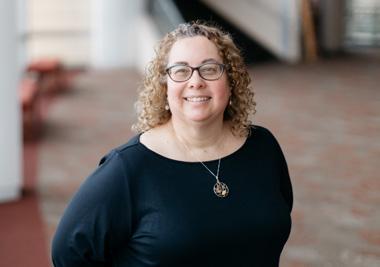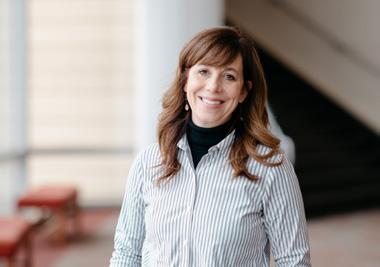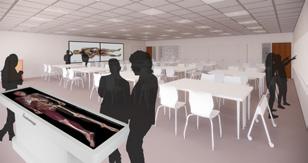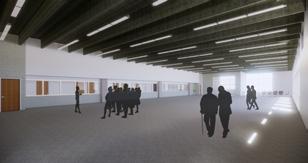
4 minute read
Compassion, communication and care: Realizing new directions with Physician Assistant program
Physician assistants are an essential component to the delivery of quality care with good outcomes, meeting critical shortages of primary care providers in both rural and urban environments.
North Central’s health sciences offerings are expanding again, with a Master of Science in Physician Assistant Studies (MSPAS) program slated to begin with a cohort of 30 students in August 2021 (provided accreditation-provisional is earned). The program received preliminary approval from the Higher Learning Commission in March and the student application process opened April 30. Notification of accreditation status will occur in March 2021.
“North Central’s PA program is one of the few community-based programs where a small class of 30 is nurtured in a relationship-based model,” said Marci J. Swede, dean of the School of Education and Health Sciences and professor of health sciences. “A graduate from North Central will be a compassionate healer, communicative leader, lifelong learner, and passionate advocate for their patients and their profession.”
WHY PHYSICIAN ASSISTANTS? The MSPAS program gives students the opportunity to prepare for a satisfying career while responding to significant demand in the health care field.
Employment for physician assistants is estimated to grow by 37 percent in the next 10 years, an increase of 39,600 jobs according to the Bureau of Labor Statistics. That compares very favorably with the expected growth of other healthcare careers in the next decade. The program requires two years to complete as opposed to as many as seven years for other medical degrees.
“The leadership at North Central recognized an opportunity to build programs that provide healthcare solutions to societal problems,” Swede said. “This was an opportunity to grow an advanced clinical healthcare program that is in high demand.”
Physician assistants work closely with doctors in both inpatient and outpatient settings. They are trained and called on to examine patients, order and interpret diagnostic studies, diagnose disease and provide evidence-based, safe pharmacologic, medical and surgical treatment.
HANDS-ON LEARNING The MSPAS program is designed to take 24 months, with a year of didactic instruction and another year of clinical work averaging 40 hours per week.

Marci J. Swede dean of the School of Education and Health Sciences and professor of health sciences

Mary Groll, M.D. program director, master of science in physician assistant studies
“One of the unique aspects of North Central’s MSPAS program has been our ability to build it from the ground up using accreditation standards to prepare graduates to be competent and compassionate leaders in their field as part of a broader healthcare team,” said Mary Groll, M.D., North Central’s program director. “Students will have opportunities throughout the program to develop skills for successful communication and teamwork.”
North Central hopes to exceed accreditation standards in designing the curriculum for the MSPAS program, which will be administered by both expert faculty and experienced clinicians, and supported by a robust medical library. The program is a competency-based model, an educational pedagogy that ensures the development of skilled medical professionals. Students and faculty will complete many competency assessments and self-assessments during the program to ensure the level of knowledge and skill required to practice medicine safely. During the first year, students will engage in numerous hands-on experiences beyond classroom instruction, using the resources of the new academic and health sciences facility (see sidebar).
“The building will have rooms for problembased learning; a dedicated lab to practice technical skills from starting IVs to placing advanced airways; high fidelity and low fidelity simulation mannequins in a space that mimics the hospital setting; and fully functional outpatient examination rooms,” said Swede.
In year two, students will move out of the classroom and participate in six-week core-clinical rotations with community medical partners in general surgery, emergency medicine, internal medicine, behavioral health, pediatrics, women’s health, family practice, primary care or a surgical elective.
NEW PROGRAM TO BREAK NEW GROUND IN MORE WAYS THAN ONE
Construction is underway on a new home for health sciences at North Central College. A four-story facility, similar in architectural design to the Wentz Concert Hall & Fine Arts Center, will open in time for the arrival of the first cohort of MSPAS students in the fall of 2021.
The new building, which will be located on Chicago Avenue, adjacent to Patterson Hall, will include cutting-edge features and unique spaces. Inside will be simulation spaces for recreating intensive care units and hospital environments, and a skills classroom with a 3D dissection table projecting onto a 16-foot television monitor, allowing for a detailed look at physical specimens (pictured below, top). It will also have space for interprofessional education.
The facility will have classrooms, laboratory spaces and offices for the physician assistant program, occupational therapy program and a future program. Students will have access to group study areas in just about every corridor of the building.
In addition, space has been incorporated for an engineering manufacturing process lab with lasers and mills for cutting heavy supplies and even space for a crane for moving large materials (pictured below, bottom).







